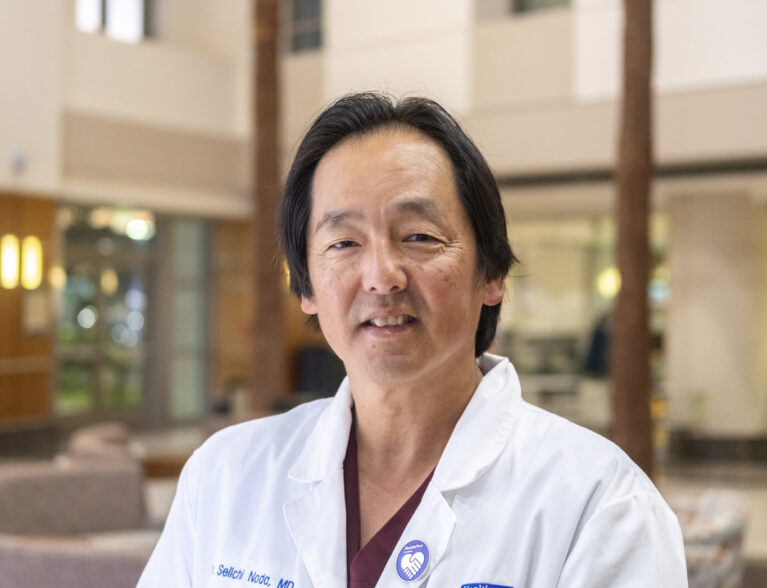
Health First’s Heart & Vascular Program was recently recognized for the quality of its coronary bypass surgery, earning a third straight 3-star rating from the Society of Thoracic Surgeons, the group’s highest rating for patient outcomes and other measures.
There are three active, full-time heart surgeons in the Health First coronary artery bypass grafting (CABG) program, backed up by an expert cardiothoracic surgical team.
WebMD reports that CABG is the most common type of open-heart surgery in the U.S., with nearly 400,000 procedures done annually.
“Heart bypass surgery is like clearing a fuel line,” says Seiichi Noda, MD, a Harvard-trained doctor who is one of the cardiothoracic surgeons at Health First. “It creates a new route called a bypass for blood and oxygen to go around a blockage to reach your heart.”
According to the National Heart, Lung and Blood Institute within the National Institutes of Health, coronary artery bypass grafting, also called heart bypass surgery, is a surgical procedure to improve blood flow to the heart muscle. It may be needed when the arteries supplying blood to the heart, called coronary arteries, are narrowed or blocked.
Surgeons may recommend the surgery to either lower your risk of a heart attack if you suffer from coronary heart disease, or in emergency situations, to treat a severe heart attack.
CABG uses healthy blood vessels from another part of the body and connects them to blood vessels above and below the blocked artery. This creates a new route for blood to flow that bypasses the narrowed or blocked coronary arteries. The blood vessels are usually arteries from the arm or chest, or veins from the legs.
“There are several different types of bypass surgery. In traditional surgery, the patient is hooked up to a heart-lung machine so that the beating of the heart can temporarily be stopped,” says Dr. Noda. “After the bypass grafts are placed where needed, the heart is restarted.
”An off-pump CABG is done without the use of a heart-lung machine. This means the heart continues to send blood to the rest of the body during the surgery.
“The hybrid technique combines two standard treatments for coronary artery disease – coronary angioplasty with stents and coronary artery bypass graft surgery. It uses the heart-lung machine to help stabilize the part of the heart the doctor is not working on.”
Dr. Noda explains that the majority of these surgeries are not emergencies. A patient will visit his or her doctor with symptoms such as shortness of breath, which lead to a diagnosis of coronary artery disease that is then treated with surgery.
“Actual emergencies, where a person’s heart can’t support his or her body, don’t happen as often anymore since so many of our medical colleagues can put in a catheter, stent, etc., to stabilize or cure the patient,” he says.
Sometimes other methods can work instead of surgery, according to Dr. Noda. “Medical therapy and stents are two options, although the number of blockages, how severe they are and where they are located need to be considered.
“Generally, the patients we see for this procedure are older. As time goes by, the condition is more likely to develop. Other contributing factors include obesity, high blood pressure, diabetes and – especially in younger patients – high cholesterol.”
The benefits of CBAG last about 10 years. “You can’t cure anyone, all you can do is fix the problem,” Dr. Noda says. “The good news is that progress continues to take place, and new procedures improve treatment and results.”
Regarding the 3-star rating, Dr. Noda says, “This recognition is a significant honor for the entire Heart & Vascular team at Health First, showcasing our unwavering dedication to quality and exceptional patient outcomes. Earning this 3-star rating is a powerful reflection of the expertise, compassionate care, and outstanding service that define our team and the Heart & Vascular program at Health First.”
Seiichi Noda, MD, is a board-certified cardiothoracic surgeon. He completed his cardiothoracic surgery residency as an Arthur Tracy Cabot Fellow at Brigham and Women’s Hospital in Boston and his cardiothoracic surgery residency at Barnes-Jewish Hospital, Washington University School of Medicine, in St. Louis. Dr. Noda completed his general surgery residency and internship in the Department of Surgery at the Brigham and Women’s Hospital, Harvard Medical School, and earned his medical degree from the University of Chicago’s Pritzker School of Medicine. His BS in Biochemistry is from Indiana University. Health First Cardiothoracic Surgery is at 1350 Hickory St., Suite 102, Melbourne. The phone number is 321-434-3455.



